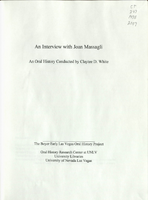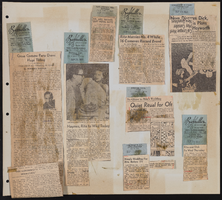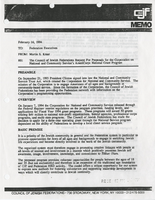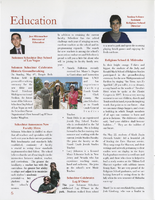Search the Special Collections and Archives Portal
Search Results
Las Vegas Land & Water Company Records from the Las Vegas Valley Water District
Identifier
Abstract
The Las Vegas Land & Water Company Records from the Las Vegas Valley Water District (1918-1989) are primarily comprised of contracts, correspondence, and maps that document the establishment of a water distribution system in Las Vegas, Nevada that would provide water using the state's Colorado River allocation. The records include water main extension agreements, correspondence, and bills of sale for water main construction, as well as articles and correspondence documenting the groundwater shortage in Las Vegas. The collection also includes maps for water distribution systems and pipelines throughout the Las Vegas Valley.
Archival Collection
Forever in Our Hearts Documentary
Identifier
Abstract
The collection is comprised of a short documentary film,
Archival Collection
UNLV Libraries Collection of Circus Circus Hotel and Casino Promotional Materials and Reports
Identifier
Abstract
The UNLV Libraries Collection of Circus Circus Hotel and Casino Promotional Materials and Reports includes annual reports, financial reports, newspaper and magazine clippings, press kits, press releases, and promotional materials for the Circus Circus hotel and casinos in Las Vegas, Nevada, and Reno, Nevada, dating from 1972 to 2006.
Archival Collection
Las Vegas African American Community Conversations round table interviews
Identifier
Abstract
The Las Vegas African American Community Conversations is a four-part conversation with local Las Vegans. The first part of the round table is moderated by Trisha Geran with a central theme of "Migration, Work and Community Emergence." The panelists discuss the early history of the African American community in Las Vegas, Nevada. They also discuss how and why their families moved to Las Vegas, most citing the economic opportunities as a major factor. The participants share their personal histories and family histories building up the African American community in downtown Las Vegas and the Westside. The second part of the round table is moderated by Sonya Horsford with a central theme of "Education, Economy, and Integration." The panelists discuss the Clark County School District pre- and post-integration. They discuss the hardships of the Sixth Grade Center Integration Plan on the African American community as well as discussing the differences in the school facilities. The round table participants also discuss the social services and social programs and the history of those programs from the African American perspective. They also discuss civic involvement and the various civic groups started by the panelists, and share discrimination they faced.
The third part of the round table is moderated by Claytee D. White with a central theme of "Civil Rights and Entertainment." The panelists discuss the racism and segregation present in Las Vegas and discuss how African American community leaders worked to integrate African Americans into the Las Vegas community. They discuss the 1969 riots in detail, and discuss African American entertainers and the entertainment industry. They share personal experiences working in the entertainment industry and discuss the importance of the local unions, such as the Culinary Workers Union Local 226, the International Alliance of Theatrical Stage Employees Local 720, and their contributions to the unions. The fourth and final part of the round table is moderated by Rachel Anderson with a central theme of the "Early African American Legal Community." The panelists discuss the foundations of the professional legal community in Las Vegas, noting the contributions of Charles Keller, Dr. William Bailey, and the Reverend Marion Bennett as driving forces for civil rights activism in Las Vegas. They share their experiences growing up in Las Vegas facing discrimination and segregation. Lastly, they share the changes they have seen and how both the legal and African African communities have grown.
Archival Collection

Dr. Javier A. Rodríguez oral history interview: transcript
Date
Archival Collection
Description
Oral history interview with Dr. Javier A. Rodríguez conducted by Elsa Lopez and Barbara Tabach on December 19, 2019 for the Latinx Voices of Southern Nevada Oral History Project. Dr. Javier Rodríguez, Biology Professor at the University of Nevada Las Vegas, talks of his personal and educational history that led him to UNLV. He discusses his migration from Puerto Rico to California where he received his PhD from the University of California Berkley and became a biological museum curator for various animal specimens. He later moved to Las Vegas to teach at UNLV where he has now been for nearly two decades; Dr. Rodríguez shares how UNLV has changed since he first started working here, including the university's increased interest in faculty research to become a Top Tier institution. Subjects discussed include: Puerto Rico; University of California Berkley; University funding; Tier 1 research institutions.
Text
Claudine Williams Papers
Identifier
Abstract
The Claudine Williams Papers (1956-2009) contain awards, contracts, personal and business correspondence, newspaper clippings, and photographs pertaining to Las Vegas, Nevada businesswoman and philanthropist, Claudine Williams. The collection also includes extensive information on her hotel and gaming properties, including the Silver Slipper Gambling Hall, Holiday Casino, and Harrah's Hotel and Casino, as well as her honorary doctoral degree, medals, and audiovisual materials of interviews, news reports, and events.
Archival Collection

Transcript of interview with Joan Massagli by Claytee White, August 19, 2010
Date
Archival Collection
Description
Joan Massagli spent her childhood in the Tacoma, Washington area, singing three-part harmony—a member of a musically talented family that included five children and an aunt and uncle who raised all the kids to enjoy music. By high school in the early 1950s, she and her two older sisters were regulars on a local TV show. In 1956, the Sawyer Sisters act was formed and they were soon obtaining regular gigs in Las Vegas. Their popularity continued form 1957 to 1964 and they played many of the major hotels, usually as a warm up act for headliners that includes a list of names such as Roy Clark, Louis Prima, Shecky Greene, and Delia Reece. At first the Sawyer Sisters included older sister Nanette Susan and Joan. When Nanette quit to raise her family, youngest sister Kate stepped into what was called a "lively and lovely" trio. Joan met her future husband and musician Mark Tully Massagli, while performing in the early 1960s. Caring for ailing parents while working mostly in Las Vegas, the couple made Vegas home. Even after the Sawyer Sisters name faded from the Strip's marquees, Las Vegas remained home to the Massagli's, who raised their children here. Today they live in the Blue Diamond Village area and recall the changes that have occurred on the Las Vegas Strip—especially from an entertainer's point of view.
Text



